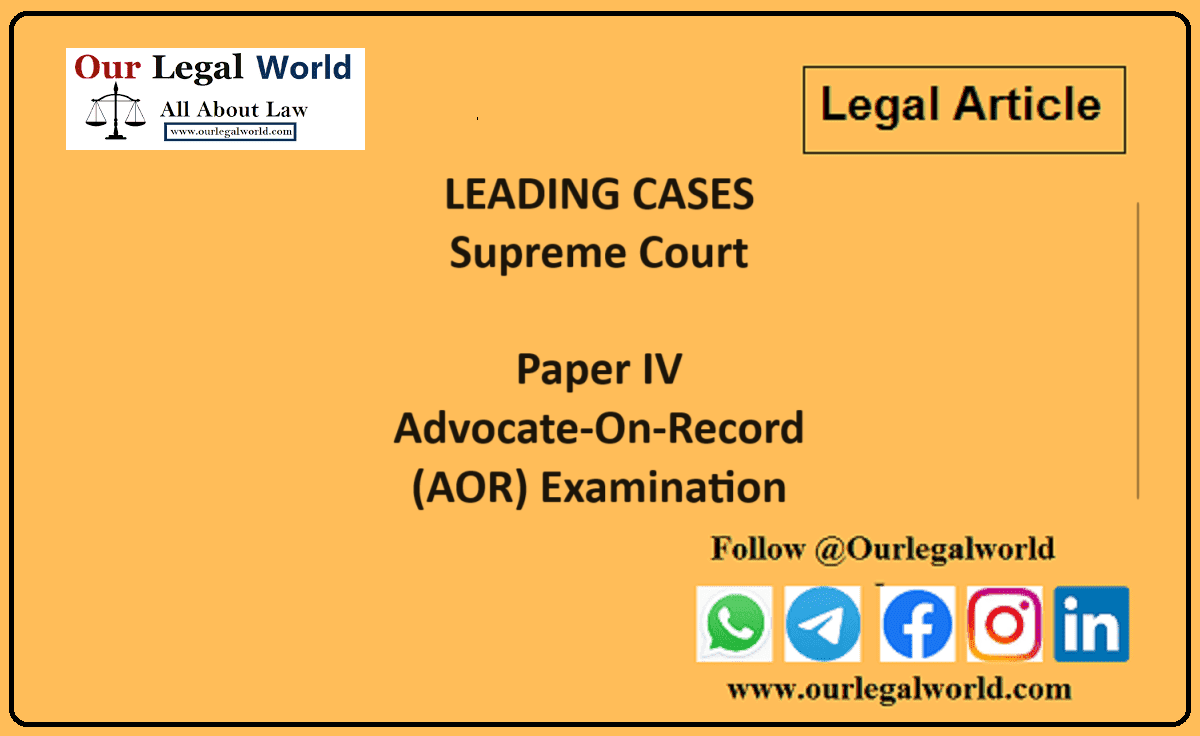Condition and warranties on sale of goodsIntroduction
The Sale of Goods Act, 1930 deals with sale of goods and the contract of sale of goods. Under the Act, goods sold from owner to buyer must be sold for a certain price and at a given period of time.
In contract of sale of goods, there is a contract where the seller transfers or agrees to transfers the goods to the buyer for a certain consideration. In this Act, the goods are sold and purchased by entering into the contract by the parties with certain conditions and warranties on sale of goods.
Goods:-
In general terms, goods may be of any movable thing and it is transferable.
‘Goods’ is defined as per Section 2 (7) of the ‘Act’ as. “Every kind of movable property other than actionable claims and money; and includes stock and shares, growing crops, grass, and things attached to or forming part of the land which are agreed to be severed before sale or under the contract of sale.”
There are two types of the goods.
- Existing Goods :- The goods which are exist at or before the time of sale are the existing goods. The existing goods are divided into two parts.
• Specific Goods:- The goods which are specified in the contract of sale of goods are called as specified goods.
• Unascertained Goods:- The goods which are not specified in the contract of sale of goods are called as unascertained goods. - Future Goods:- The goods which does not exist at or before the time of the sale of goods are future goods.
Contract of sale of goods:-
An agreement which is enforceable by law is contract. The section 4(1) of the Sale of Goods Act, 1930 states that – ‘A contract of sale of goods is a contract whereby the seller either transfers or agrees to transfer the property in goods to the buyer for a decided price.’
Elements of A Contract Of Sale
- There must be two parties for enter into contract of sale. The one must be the seller and the other one must be the buyer.
- The contract must be of movable property. The movable property includes existing goods, goods in the possession or the ownership of the seller or future goods.
- There must be consideration of price.
- The ownership of the property of goods must transfer from the seller to the buyer.
- The contract of sale may be absolute or conditional.
- There must be competency of the parties and legality of the objects and consideration.
Condition on sale of goods:-
According to the section 12 of the Act, a condition in a contract of sale is the stipulation which constitute the hardcore of the contract and is essential to the main purpose of the contract.
Kinds of condition:-
(a) Express condition:- A condition which is expressly provided in the contract of sale is the express condition.
(b) Implied condition:- Implied condition is not expressly provided in the contract of sale, it may be implied by the fact or any or law or statute. There are seven types of implied condition – - Condition as to title
- Condition as to description
- Condition as to sample
- Condition as to sample as well as description
- Condition as to quality or fitness
- Condition as to merchantability
- Condition as to wholesomeness
- Condition as to title:- The seller has a right to sell the goods if there is any implied condition on the side of him. And if there is any agreement to sell, the seller has right to sell the goods at the time when the property is to pass.
There is an implied warranty on the part of the buyer that he shall have and enjoy quiet possession of the goods. - Condition as to description:- The goods must correspond with the description if the contract of sale of goods is by description. If the goods are not in accordance with the description of goods, the buyer is not bound to accept or pay for the goods.
- Condition as to sample:-
- The goods are of the kind and quality of the sample showed at the time of sale.
- Condition as to sample as well as description:- The goods must correspond with both the sample and description. If any one of them is found missing, the buyer can reject the contract.
- Condition as to quality and fitness:- The buyer himself has to be careful about the quality and fitness of the goods.
- Condition as to merchantability:- The goods to be sold shall be of merchantable quality.
- Condition as to wholesomeness:- The goods shall be fit for human consumption if the goods are eatables or foodstuff.
Warranty on sale of goods:-
According to the section 12 of the Act, a warranty is a stipulation collateral to the main purpose of the contract, the breach of which gives rise to a claim for damages but not a right to reject the goods and treat the contract as repudiated.
Also Read: PLEDGE OF CONTRACT LAW- PAWNOR, PAWNEE RIGHTS AND DUTIES
(a) Express warranty:- The express warranty is when the term is expressly provided in the contract of sale. The both of the parties may agree to the term at the time of the contract.
(b) Implied warranty:- The implied warranty is when the term is not expressly provided in the contract of sale but it is implied by the law or statute. There are following implied warranties –
- Warranty as to quiet
- Warranty against encumbrances.
- Warranty to disclose the dangerous nature of the goods.
- Warranty as to quiet:- The buyer has the right to enjoy quiet possession of the goods.
- Warranty as to encumbrances:- The goods shall be free from any encumbrance or charge from the third party at or before the time of the sale.
- Warranty to disclose the dangerous nature of the goods:- The buyer can claim the damages if the seller did not disclose the dangerous nature of the goods.
Case law:-
Bedi And Bedi Private Limited vs Haileyburia Tea Estate Limited on 21 March, 2019
An implied warranty or condition as to quality or fitness for a particular purpose may be annexed by the usage of trade. An express warranty to condition does not negative a warranty or condition implied by this Act unless inconsistent therewith.Commr Of Customs (Preventive) v. Aafloat Textiles (I) Pvt Ltd and Ors. (2009) 11 SCC 18
When the sellers display their goods in the open market, it is for the buyer to make a proper selection or choice of the goods. The buyer alone shall be responsible for checking the quality and suitability of goods before a purchase is made. The said rule owes its origin to the fact that in the early times most of the sales used to took place in the market.
Jones v Bowden
Where drugs were sold by auction and where it is a usage of trade to disclose beforehand any sea-damage such disclosure must be made. In case no such disclosure has been made and the goods are found to be defective, it will be taken as a breach of warranty.
When a condition should be treated as warranty:- Section 13 of the Sale of Goods Act lays down the following two conditions when a condition becomes a warranty:
- Waiver by buyer: The buyer has the option accept the goods and claim damages from the seller. If he once decides to waive the condition, he cannot afterwards insist on its fulfilment.
- Acceptance of goods by buyer: Where a contract of sale is not severable, ie. it is indivisible and the buyer has accepted the goods or part thereof, the breach of any condition is to be treated as a breach of a warranty.
Difference between condition and warranty:-
- A condition is an obligation which requires being fulfilled before another proposition takes place. A warranty is a surety given by the seller regarding the state of the product.
- The term condition is defined in section 12 (2) of the Indian Sale of Goods, Act 1930 whereas warranty is defined in section 12 (3).
- The condition is vital to the theme of the contract while Warranty is ancillary.
- Breach of any condition may result in the termination of the contract while the breach of warranty may not lead to the cancellation of the contract.
- In the case of breach of condition, the innocent party has the right to rescind the contract as well as a claim for damages. On the other hand, in breach of warranty, the aggrieved party can only sue the other party for damages.
Remedies of breach of a condition:-
- Under section 57 of the Act, if there is any intentionally or wrongfully negligence of the seller regarding the delivery of the goods the buyer can claim the damages of non-delivery of the goods.
- Under section 59 of the Act, if there is any breach of warranty from the side of the seller, the buyer is not entitled to claim damages but he can diminished or extended the price of the goods. And the seller can claim for the breach of warranty if the buyer has diminished or extended the price of the goods.
- Under section 62 of the Act, if there is any breach of contract, either the seller or the buyer can recover the damages where by the law any special damages or interest may be recoverable.
- Under section 60 of the Act, if there any party of the contract renounces the contract before the delivery of the goods, the other party may wait till the date of delivery of the goods or may treat the contract as annulled and claim the damages.
Conclusion
The condition and warranties play a vital role in the sale of goods. Whether the condition and warranties are express or implied, the parties are bound to fulfill them. Sometimes the condition may treat as the warranty but the warranty cannot treat as a condition. If there is any breach of a condition or warranty by the side of any party to the contract, the other party has the right to claim the damages.
Bibliography
- The Sale of Goods Act, 1930
- www.indiankanoon.org
Also Read: Quasi Contract under Section 68 to 72 of the Contract Act







![Tax Law Internship at Legum Attorney [Chamber of Ashish Panday], Delhi : Apply by 15th May 2025](https://www.ourlegalworld.com/wp-content/uploads/2025/05/IMG_0113-min.png)

